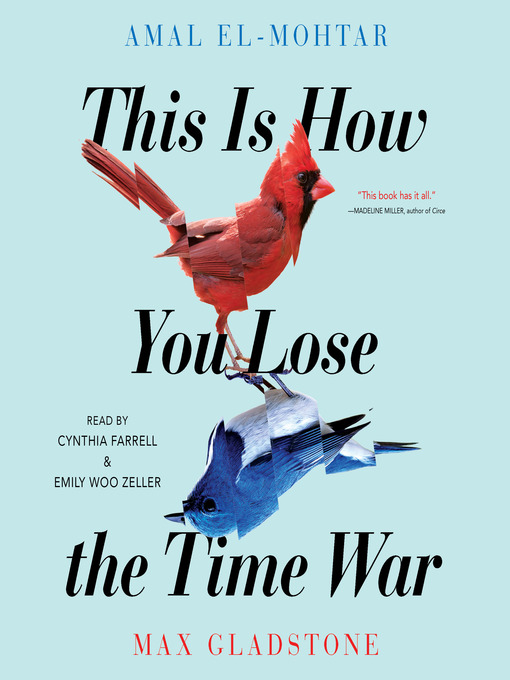Submitted by Anonymous on Fri, 04/24/2020 - 14:59
Staff Picks: This Is How You Lose the Time War by Amal El-Mohtar and Max Gladstone
 Picked by Michelle N.
Picked by Michelle N.
What if Michael Moorcock had decided one day to rewrite the Spy vs. Spy comics as an epistolary novel set in his Dancers at the End of Time universe, but aimed it at poets and at fans of The Hunger Games or maybe early Anne Rice? (Not that those are necessarily mutually contradictory.)
This book, like Miranda Priestly in The Devil Wears Prada, gives the impression of being a triumph of style over substance—but only if you don’t know better. Style *is* substance, sometimes. And when it’s not, well, what’s wrong with having your substance conveyed by an absolute torrent of luscious prose, profusely elegant and full of biting wit?
Nothing, I say. And there’s nothing wrong with a slim epistolary novel, surreal and crystalline-dense like a crazy fractal oil-spill diamond built up of fragrant slabs of impassioned ugly/beautiful imagery like slam poetry, whose setting is hard to grasp and flicks past like a universe-sized slideshow and whose characters know full well they are stereotypes.
So: our protagonists, Red and Blue. Each is a… well, not a soldier. More of an MI6 agent in a time of war. A time war. Each is fighting for the future they were born in—and, not coincidentally, for their own individual existence. Since of course if things had gone differently, neither of them would have been born in the first place. If things *do* go differently (and causing things retroactively to have gone differently in the other faction’s timeline is what Red and Blue are each hired to do), at least one of them will never have existed. Neither can live while the other survives.
Which is a problem. Because in the course of a playfully vicious cat-and-mouse exchange of letters between realities, engaged in at first purely because it made the game more fun, Red and Blue fall in love.
Yes yes yes. It all sounds very predictable except maybe where it’s just incomprehensible, and I won’t deny that it starts out that way. I enjoyed it from go, but saw it as frivolous, a guilty pleasure. But as time went on and more of the story rushed past me, with me just paddling along as best I could to keep up while all this improbable scenery whizzed by, I began to fall in love with it. Much, I think, as Red and Blue fall in love with each other: unwittingly, unexpectedly, ineluctably.
Here’s the exact passage where I fell in love with the book. Red, from the machine universe, had written to Blue, from the biotech universe, about how she enjoys eating, which is optional for people in her time. This taste sets her apart from her contemporaries, who find the whole idea of food not just unusual but actually revolting and even shocking. Blue replies:
“Absent from your mention of food—so sweet, so savory—was any mention of hunger. You spoke of the lack of need, yes. No lion in pursuit, no animalistic procreative desperation. And these lead to enjoyment, certainly.
“But hunger is a many-splendored thing. It needn’t be conceived only in limbic terms, in biology. Hunger, Red—to sate a hunger or to stoke it—to feel hunger as a furnace, to trace its edges like teeth—is this a thing you (singly) know? Have you ever had a hunger that whetted itself on what you fed it? Sharpened so keen and bright that it might split you open, break a new thing out?”
Right??? To desire a thing without needing it, with no skin in the game, is surely pleasant. It gives one a sense of safety in the enjoyment. But to actually hunger, to need, to want so deeply that it’s physical—that’s a knife’s edge, dangerous. And it’s on the threshold of that danger that you are truly alive, that new things can be born.
And, I mean. Such precision of language, unafraid of using the perfect word, the exact phrase to convey the meaning, even if it might be seen as trivial or highfalutin’ or a little odd or antiquated or (heaven help us) trite. Even if the reader might have to look up one or two of those words. Words are to prose what brushwork is to painting, and the fashion in prose at least since Hemingway has been to make that brushwork as invisible as possible so that the scenes and characters and plot shine through with as little distortion as possible.
That’s begun to change, in spots at least, in the here and now. I mean, there have always been oddballs, cranks, and geniuses who wrote whatever they wanted however they wanted, gods bless them. What’s changing is that stylized and individualistic writing styles are more an accepted part of the everyday literary landscape than a couple of decades ago. This isn’t *always* a good thing in individual cases (*coughMichaelChaboncough*) (sorry-not-sorry if you’re a fan of Telegraph Avenue, which I desperately wanted to be), but it is definitely a good thing overall as it encourages creativity and diversifies what’s out there for us all to choose from.
El-Mohtar and Gladstone aren’t constantly that brilliant. I mean, who could be? To understand and convey so brilliantly the nature of desire, to depict in strobe-light flashes a conversation about desire and hunger between denizens of different realities who haven’t yet admitted to each other that their subject matter concerns them so deeply—to do all of that *constantly,* for 200 pages, is almost certainly impossible and would probably leave the reader bleeding and raw by the end, not in a good way.
No, the authors do it just often enough, and in intervals that decrease just enough as the narrative goes on, to make the reader remember that sometimes bleeding is a good thing. And to make you willing to bleed just a little more so that you can have just another chapter. Just one more.
Hungry yet?
Read this book.
To borrow the downloadable audiobook for free, click here or download the Libby app.








